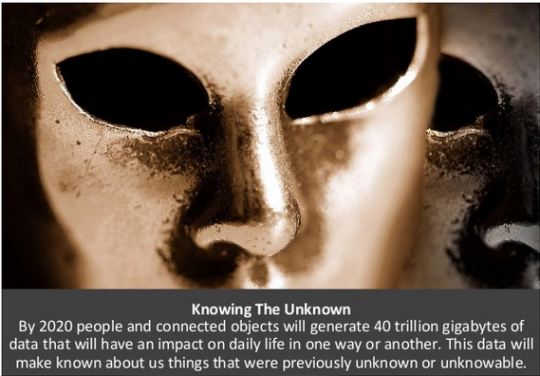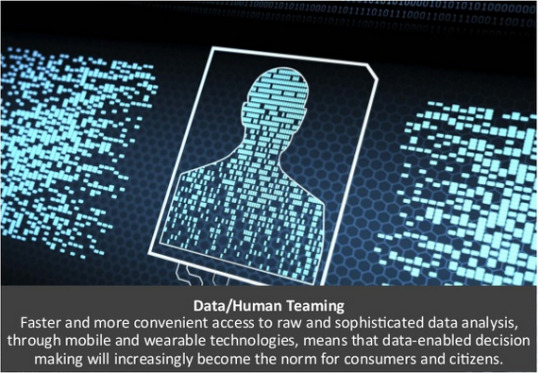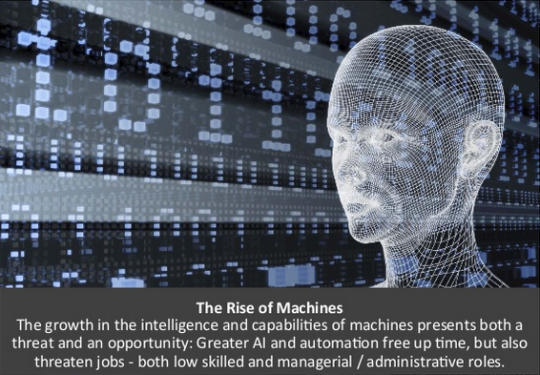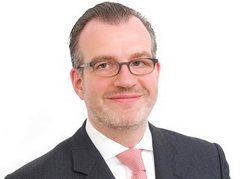Tim Jones – Programme Director and Founder of The Future Agenda
Connecting things next to connecting people – what is to expect from that development?
Tim Jones: To connect not only people but also things will affect our lives at several levels. We will enjoy more convenience, obtain more information and produce much more data. We will have to process exponentially more data than today – that will increase the demand for mobile broadband. Which is closely related to the evolution of device and screen technologies. New devices such as Google’s glasses and further development in the wearables industry continue to drive this evolution. And these devices will not only consume content – integrated cameras are also producing digital content to be distributed via networks.

At the same time new applications will constantly not only produce more data but help people to facilitate their lives and increase the efficiency of decision making and purchasing. For example the refrigerator that orders food when needed that will then be delivered.

On one hand we can expect more convenience, but will this automatisation also affect our working lives?
Tim Jones: The fast development in technology will have an impact on the professional area. But generally people´s fears are misplaced. Technology will support and enhance work and not replace it. Robots and automated systems are being used in any situation where there is a potential danger to people. At a big scale mining companies and oil companies are very keen on using technology as their working field will always put people in danger.
In less dangerous circumstances automated systems will help to improve work. This can affect back office people and middle management.

One example of enhancing work and making it more efficient is remote surgery already performed by doctors. The specialist doctors don´t need to travel around the world any more, but they are still performing the operation.
New business models and the development of peer to peer activities like Airbnb or Uber have also derived from this development – what more is to expect?
Tim Jones: Airbnb and Uber are disrupting the hotel and transportation industry right now, but I also think the future will be in peer to peer banking. People are working on far more efficient ways of doing things in every aspect of their lives, that concerns hotel booking, taxi fares, saving money etc. The bypassing of traditional organisations for instance hotel companies or financial institutions to save money is increasingly happening. The people who pay for the services and the people who provide the services will probably get just as much. The losers will be the people in between – the middle men. As people seek to improve the efficiency of industries and systems, many new business models are taking away the profits from middle man. Which from a sharing point of view is probably a very positive outcome.
One of the advantages of organizing yourself efficiently is the benefit of paying less, but you also have to take on more responsibility as a customer
Tim Jones: That´s a push point, because as you say there are limits to this. It´s all about risk. If you´re booking a hotel room and it´s not clean or free when you arrive or if you´re taking a taxi and it doesn´t turn up is inconvenient but not a huge risk. But if you´re considering health care for example you need the confidence that there is a system in place which will take care of your needs.
That brings up the question how far the responsibility will go. And how high the level of risk is the customers are willing to take or are allowed to take by the regulators.
What are the main influences that digital connectivity will have on our society within the next decade?
Tim Jones: People we are working with in the future agenda programme identified inequality as challenge. The inequality of the rich and the poor and the gap that is getting bigger, as well as the inequality in terms of access to education, access to health care and overall important access to digital connectivity. They see that the solution to the problem of wealth inequality lies in the improvement of digital connectivity and thus the improvement of health care and education as the catalysts for change. That is a big challenge but also a positive opportunity.
What new jobs will derive from the latest developments?
Tim Jones: Digitization enables the evolvement of new jobs in the area of data and privacy. In a world where people better understand the value of their data and that their data has financial and social value, we will experience many new apps which allow us to manage our data ourselves. But we may also see the jobs of data agents or data managers. These are comparable to the job of a financial advisor or a tax adviser in today’s world. We will not only assign people whose job it is to manage our finances but also engage people who advise us how to best manage our data and our datashadow to maximise the value that we get from it and to make sure that privacy issues are maintained.

Do new branches that don´t derive from technological innovation exist?
Tim Jones: In the future agenda program we had big conversations about food. Basically we throw one third of our food away – not just in the west, but everywhere. That food could feed another billion people. If we are going to have another billion people on the planet we don´t necessarily need to grow more food, we need to be more efficient in how we manage our food supply. At the moment the food supply is fragmented and we are facing the challenge to make better use of our food. That comes down to cultural issues, to how much choice you want and seasonal issues for example whether people want food that is more seasonal and local. And it also comes down to fundamental things like portion control and portion size. One new job that helps with this problem is architect of the food system. But even this development is connected to digitization. People who design how food is supplied, prepared and taken away in a more efficient way.
That would mean a complete shift in thinking?
Tim Jones: Absolutely. And perhaps not just for food but a lot of things we need to stop seeing as waste. We need to start seeing waste as a resource. There are very few parts in the world where food recycling is happening efficiently. The concerns concerning food safety can be eased when technology takes it´s part in food labeling and food tracking. So we can change our mindset when we throw food away from we are throwing value away as opposed to that´s rubbish.
What is your vision of the world in the next ten years?
Tim Jones: If I was to choose one area my hope would be that people are using better access to health care and better access to education to decrease the inequalities there are.
Dr. Tim Jones
Tim is Programme Director and Founder of The Future Agenda, the world’s first global open foresight initiative. Initially supported in 2010 by Vodafone Group, this is a major cross-discipline project that united some of the best minds from around the globe to address the greatest challenges of the next decade. In doing so, it mapped out the major issues, identified and discussed potential solutions, suggested the best ways forward and provided a unique open platform for collective innovation at a higher level than has been previously been achieved.
In addition to Future Agenda, Tim is also Director of Research of the Innovation Leaders analysis and also supports companies in the areas of innovation and growth: He is a co-founder of a global expert network, the Growth Agenda.
Tim is a recognised leader in innovation and growth and has specific expertise in helping organisations to identify new growth platforms and opportunity spaces, highlighting emerging technology areas and defining new innovation strategies. He advises a number of public bodies on these topics, is the (co) author of numerous articles and nine related books. Tim is a regular speaker at public and corporate events focusing on such topics as innovation leadership, innovation strategy and future trends in society and technology.
Future Agenda (www.futureagenda.org)
Innovation Leaders (www.innovationleaders.org)
Growth Agenda (www.growthagenda.com)






